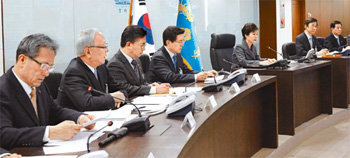Seoul will block Pyongyangs possession of nukes
Seoul will block Pyongyangs possession of nukes
Posted January. 07, 2016 11:16,

North Korea made surprise announcement on Wednesday that it conducted a test with a miniaturized hydrogen bomb. The announcement came two days ahead of North Korean leader Kim Jong Uns birthday on Friday, and three years after the third nuclear test in 2013.
The North reportedly had not sent a prior notice to China and the U.S. ahead of the test. South Korean intelligence agencies including the Defense Ministry and the National Intelligence Service failed to monitor any signs that the Norths nuclear test was imminent. The South Korean Foreign Affairs Ministry failed to confirm whether the North had conducted a nuclear test or not for more than an hour and half until the North heralded an important special announcement at around 11:30 a.m. after carrying out the test at 10 a.m. on the day.
In the North Korea`s statement released through the important special announcement on (North) Korean Central TV Station, Pyongyang said, In line with the strategic decision of the Workers Party, the first hydrogen bomb test was successfully conducted at 10 a.m. on Wednesday.
Through the test that was done purely based on homegrown technology, we verified that technical specifications of a hydrogen bomb developed newly for the test is accurate, and scientifically illustrated the power of a miniaturized hydrogen bomb, the North claimed. The hydrogen bomb test is higher than nuclear weapons development. We have proudly joined the rank of countries possessing both nuclear weapons and hydrogen bomb. We have secured the strongest deterrence. Noting that testing of a hydrogen bomb is carried out as its self-defense right due to the U.S. hostile policy (towards the North), Pyongyang said, As long as the U.S. maintains its hostile policy, we will never halt our nuclear development nor give up nuclear weapons no matter what.
The North said that its leader Kim Jong Un ordered on December 15 to conduct a first hydrogen bomb test. He signed on the ultimate order on January 3 this year. It thus indicated that Kim Jong Un ordered a hydrogen bomb test three days after the Moranbong Music Band cancelled a concert in Beijing and returned to Pyongyang from China on December 12. Pyongyang publicized earlier on December 10 Kims remarks that the North possesses a hydrogen bomb, which faced China`s criticism. Later when Beijing raised issue with content glorifying Kim Jong Un in the planned concert by the Moranbong Music Band, Kim ordered cancellation of the event.
Chances are that Kim chose to push the button for a hydrogen bomb test after judging that there were no signs Beijings pressure on Pyongyang would change any time soon. We found the North diversified routes for crude oil import to Russia, Singapore, Iran and Syria since a year ago in preparation for Chinas possible halt of crude oil supply to the North after a nuclear test, says an informed source on North Korean affairs.
As Kim Jong Uns New Years speech did not include mention of a nuclear test, the South Korean government had judged that the probability for a nuclear test declined for the time being. A source in the South Korean government says that it has been completely fooled by the Norths deceptive tactics. Seoul has reportedly decided on a plan to beef up sanctions against North Korea in far-reaching areas to counter the Norths hydrogen bomb test at the U.N. level by cooperating even with China and Russia. Inter-Korean dialogue and exchange will also reportedly be put to hold for a while in line with sanctions against the Stalinist country.
However, even growing voices in the South Korean government suggest that it is not enough to resort to the ineffective policy of repeating strengthened U.N. sanctions, as was the case for the past nuclear tests by the North, at a time when Pyongyang already conducted four nuclear tests and even claimed to have tested a hydrogen bomb. They claim that fundamental reexamination of and drastic shift in government policy aimed at denuclearization of the North is necessary.
If we insufficiently address the nuclear issue again this time, it will come to send a truly wrong signal to Pyongyang, said Yoo Seong-ok, director of the Institute for National Security Strategy in Seoul. The government should start efforts in earnest to seek game change for resolving the Norths nuclear weapons, sending signals that with its continuous attempts to pursue nuclear weapons, the North will face the end of its regime."
zeitung@donga.com
Headline News
- Med professors announce intention to leave hospitals starting Thursday
- Bridge honoring Sgt. Moon Jae-sik unveiled in Pennsylvania
- Chief of Staff Chung tells presidential secretaries to stay away from politics
- US FTC bans noncompete agreements
- N. Korea launches cyberattacks on S. Korea's defense companies







